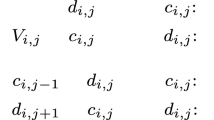Abstract
We study variants of classical stable matching problems in which there is an additional requirement for a stable matching, namely that there should not be two participants who would prefer to exchange partners. The problem is motivated by the experience of real-world medical matching schemes that use stable matchings, where cases have arisen in which two participants discovered that each of them would prefer the other’s allocation, a situation that is seen as unfair. Our main result is that the problem of deciding whether an instance of the classical stable marriage problem admits a stable matching, with the additional property that no two men would prefer to exchange partners, is NP-complete. This implies a similar result for more general problems, such as the hospitals/residents problem, the many-to-one extension of stable marriage. Unlike previous NP-hardness results for variants of stable marriage, the proof exploits the powerful algebraic structure underlying the set of all stable matchings. In practical matching schemes, however, applicants’ preference lists are typically of short fixed length, and we describe a linear time algorithm for the problem in the special case where all of the men’s preference lists are of length ≤3.
Similar content being viewed by others
References
Alcalde J (1995) Exchange-proofness or divorce-proofness? Stability in one-sided matching markets. Econ Des 1:275–287
Allan J (2002) NHS Scotland. Personal communication
Carms (2008) The Canadian Resident Matching Scheme. Wb document available at http://www.carms.ca/index.html
Cechlárová K (2002) On the complexity of exchange stable roommates. Discrete Appl Math 116:279–287
Cechlárová K, Manlove DF (2005) The exchange-stable marriage problem. Discrete Appl Math 152:109–122
Gale D, Shapley LS (1962) College admissions and the stability of marriage. Am Math Mon 69:9–15
Gale D, Sotomayor M (1985) Some remarks on the stable marriage problem. Discrete Appl Math 11:223–232
Garey MJ, Johnson DS (1979) Computers and intractability: a guide to the theory of NP-completeness. Freeman, New York
Gusfield D (1987) Three fast algorithms for four problems in stable marriage. SIAM J Comput 16:111–128
Gusfield D, Irving RW (1989) The stable marriage problem: structure and algorithms. MIT Press, Cambridge
Irving RW (1998) Matching medical students to pairs of hospitals: a new variation on an old theme. In: Proceedings of ESA’98, the sixth annual european symposium on algorithms, Venice Italy, 1998. LNCS, vol 1461. Springer, Berlin, pp 381–392
Irving RW, Leather P (1986) The complexity of counting stable marriages. SIAM J Comput 15:655–667
Knuth DE (1976) Mariages stables. Les Presses du l’Université de Montréal, Montreal
McDermid E, Cheng C, Suzuki I (2007) Hardness results on the man-exchange stable marriage problem with short preference lists. Inf Process Lett 101(1):13–19
NRMP (2007) National Resident Matching Program. Web document available at http://www.nrmp.org/about_nrmp/how.html
Roth AE (1984) The evolution of the labor market for medical interns and residents: a case study in game theory. J Polit Econ 92(6):991–1016
Schaefer TJ (1978) The complexity of satisfiability problems. In: Proc 10th ann ACM symp on theory of computing. ACM, New York, pp 216–226
SFAS (2008) Scottish Foundation Allocation Scheme. Web document available at http://www.nes.scot.nhs.uk/sfas/
Author information
Authors and Affiliations
Corresponding author
Rights and permissions
About this article
Cite this article
Irving, R.W. Stable matching problems with exchange restrictions. J Comb Optim 16, 344–360 (2008). https://doi.org/10.1007/s10878-008-9153-1
Published:
Issue Date:
DOI: https://doi.org/10.1007/s10878-008-9153-1




